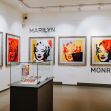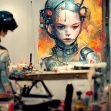“Artificial intelligence” and “deep-fake” technology are getting more powerful by the day, raising a host of complex legal questions. The U.S. Copyright Office appears to have settled at least one debate recently, ruling that images created using the AI-powered Midjourney image generator should not have been granted copyright protection.
AI image-generation software has become a hot-button issue among the tech and content-generation crowds. Artists and other content creators argue that so-called “AI art” does not actually make anything new; instead, the software scours the internet for existing images and then uses prior work to generate content in response to the prompts of the user.
As explained by Ahmed Elgammal, professor of computer science and director of the Art and Artificial Intelligence Laboratory at Rutgers University, AI “artists write algorithms not to follow a set of rules, but to ‘learn’ a specific aesthetic by analyzing thousands of images. The algorithm then tries to generate new images in adherence to the aesthetics it has learned.”
Last year, author Kris Kashtanova tried to register a comic book that was created using the AI image generator Midjourney. The copyright was originally granted, which was hailed as a win for AI artists. Upon further review, this February the Copyright Office chose to cancel the former copyright and grant new, more limited protection. The new copyright will cover the text of the work as well as the arrangement of the images and text, but it will not cover the images themselves.
The Office claimed Kashtanova’s original application failed to disclose that the images were generated using Midjourney. Upon learning that the images were created using AI software, the Office sent a notice to Kashtanova informing her of their intent to cancel the copyright registration unless convinced otherwise. Kashtanova’s attorney argued that she had, in fact, authored every aspect of the comic, “with Midjourney serving merely as an assistive tool.”
The government was not persuaded. The Office found that, rather than being “a tool that Ms. Kashtanova controlled and guided to reach her desired image, Midjourney generates images in an unpredictable way.” The Office noted in particular that Midjourney starts with “randomly generated noise that evolves into a final image,” preventing users from exercising true control over the final product.
Kashtanova did not, for example, take a photo and then use editing tools to modify and change the picture. Rather, Midjourney took the prompts from Kashtanova and generated a few options. The Office likened it to Kashtanova hiring a visual artist and giving that artist some basic instructions; in that instance, Kashtanova would clearly not have actually created the final product.
To be clear, the decision from the Copyright Office might not be the stake through the heart of “AI art” that many artists and content creators would hope it to be. The Office essentially found that Midjourney, not Kashtanova, created the images. As much as many online would like to characterize AI image generation as glorified art theft, the Office did not find, for example, that the images are derivative works that belong to the original creators from which Midjourney drew inspiration.
For her part, Kashtanova has hailed the decision as a win for herself and other AI artists. In a post on Instagram, she called the ruling “great news” because it protected her rights over the comic book as a whole. She admitted to being “disappointed” in the aspect of the decision concerning the individual images, however, contending the Office “didn’t understand the technology so it led to a wrong decision.” She stated plans to appeal the decision, which may yield a more definitive court ruling on the question.






